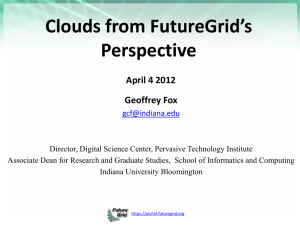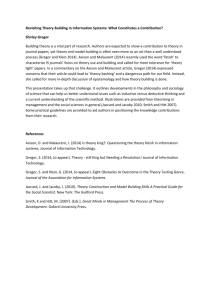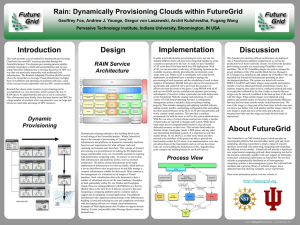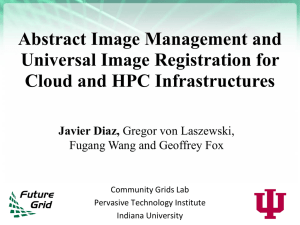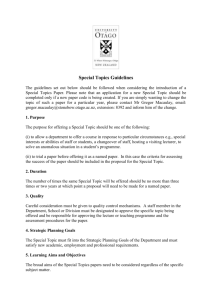Biweekly Report
advertisement
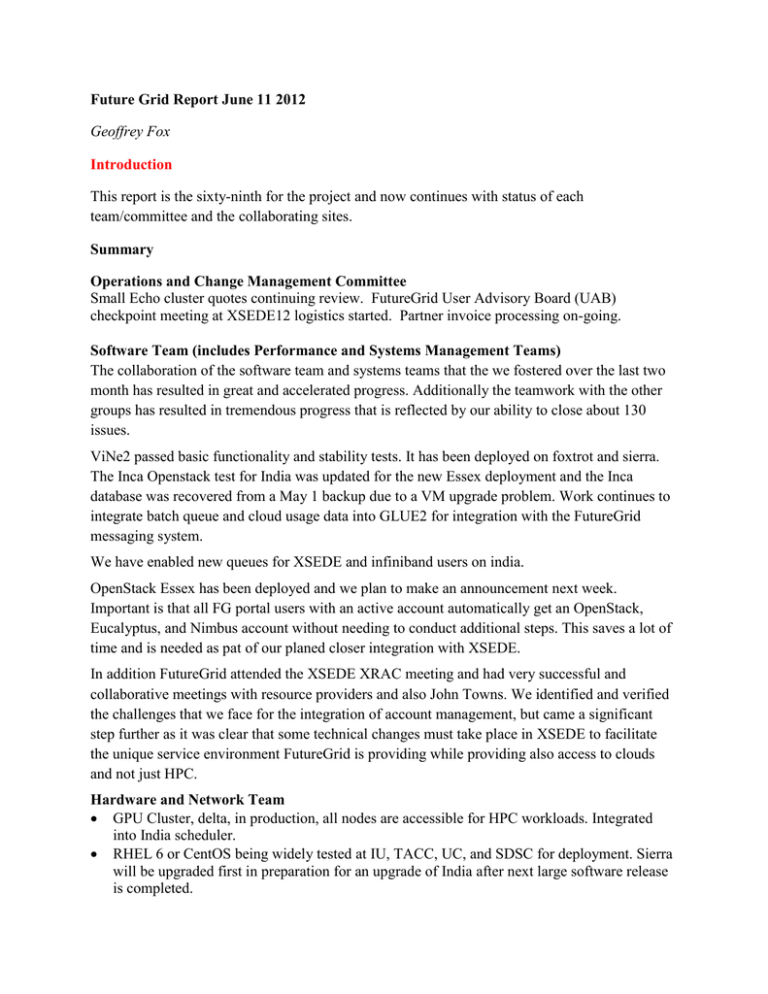
Future Grid Report June 11 2012 Geoffrey Fox Introduction This report is the sixty-ninth for the project and now continues with status of each team/committee and the collaborating sites. Summary Operations and Change Management Committee Small Echo cluster quotes continuing review. FutureGrid User Advisory Board (UAB) checkpoint meeting at XSEDE12 logistics started. Partner invoice processing on-going. Software Team (includes Performance and Systems Management Teams) The collaboration of the software team and systems teams that the we fostered over the last two month has resulted in great and accelerated progress. Additionally the teamwork with the other groups has resulted in tremendous progress that is reflected by our ability to close about 130 issues. ViNe2 passed basic functionality and stability tests. It has been deployed on foxtrot and sierra. The Inca Openstack test for India was updated for the new Essex deployment and the Inca database was recovered from a May 1 backup due to a VM upgrade problem. Work continues to integrate batch queue and cloud usage data into GLUE2 for integration with the FutureGrid messaging system. We have enabled new queues for XSEDE and infiniband users on india. OpenStack Essex has been deployed and we plan to make an announcement next week. Important is that all FG portal users with an active account automatically get an OpenStack, Eucalyptus, and Nimbus account without needing to conduct additional steps. This saves a lot of time and is needed as pat of our planed closer integration with XSEDE. In addition FutureGrid attended the XSEDE XRAC meeting and had very successful and collaborative meetings with resource providers and also John Towns. We identified and verified the challenges that we face for the integration of account management, but came a significant step further as it was clear that some technical changes must take place in XSEDE to facilitate the unique service environment FutureGrid is providing while providing also access to clouds and not just HPC. Hardware and Network Team GPU Cluster, delta, in production, all nodes are accessible for HPC workloads. Integrated into India scheduler. RHEL 6 or CentOS being widely tested at IU, TACC, UC, and SDSC for deployment. Sierra will be upgraded first in preparation for an upgrade of India after next large software release is completed. SDSC data center experienced multiple power outages during this period. New /users and /project space being configured at IU, 100 TB total. System software updates applied widely during maintenance. Training, Education and Outreach Team (includes user support) Members of the TEOS team participated in activities related to the transition of the FutureGrid portal team. A Web presence has been created for the Science Cloud Summer School. Continued to share information online and develop new possibilities for social media interaction. Knowledgebase Team Continued progress reduced by vacation Site Reports University of Virginia No report received University of Southern California Information Sciences USC reported no progress reports as next round of funding by NSF still not available. University of Texas at Austin/Texas Advanced Computing Center Continued progress on Experiment harness and portal. Alamo cluster stable University of Chicago/Argonne National Labs Support and preparations for the XSEDE conference. We also started work with a student from France who will be testing the new multi-cloud service on FutureGrid. Continued work on autoscaling for Nimbus University of Florida System maintenance activities were performed on the foxtrot storage server; the machine remains being serviced by IBM. ViNe2 package that integrates all the improvements has passed basic functionality and stability tests and it is now ready for an official release. ViNe2 has been deployed on foxtrot and sierra and UF team will closely monitor these deployments. Fortes chaired the operations committee, and Figueiredo chaired the TEOS team and participated as a deputy in the EOT track of the XSEDE’12 conference. San Diego Supercomputer Center at University of California San Diego UCSD worked resolve consequences of a number of power outages that interrupted service to Sierra, restored the Inca server database after a bad VM upgrade, and updated the Inca Openstack test for the new Essex deployment. University of Tennessee Knoxville To test our performance tools for virtual environments, UTK has been performing tests HPC Challenge (HPCC) benchmark suite running on more than one virtual CPU. Substantial details in full report that follows Detailed Descriptions Operations and Change Management Committee Operations Committee Chair: Jose Fortes Change Control Board Chair: Gary Miksik, Project Manager Continued review of quotes from Dell, HP, IBM, and ICC for the new Intel “Sandy Bridge” architecture on which we plan to extend the Bravo cluster and run the ScaleMP software. We continue to work with the low-quote vendor, ICC, as their quoted SuperMicro equipment needs to be certified by ScaleMP for their software. We have asked for a statement that such a certification will be made, which requires ICC and SuperMicro to come up with that agreement. If that does not materialize, we will select the “next” vendor quote in line and focus on its review. We are working with ICC, as their quote is substantially less than the next vendor’s quote for the 384 GB RAM solution. We are continuing the financial analysis for determining the amount of Indiana University cost-share that has been recorded for PY2 (from project inception thru Sep 30, 2011). Once we have determined these actuals, we will extend the analysis for PY3 (ending Sep 30, 2012). We have begun working with the XSEDE12 folks and the InterContinental hotel in Chicago for a possible FutureGrid User Advisory Board (UAB) checkpoint meeting at the XSEDE12 conference. We will have a conference call setup for those UAB members who are not planning on attending XSEDE12. Notices to the UAB membership will be going out on Monday June 11th. The last UAB was at SC11, so the time is right for this. We have begun working with NCSA on the technical connectivity to our Indiana University site for the Science Cloud Summer School (July 30 – August 03). Financials. NSF spending authority is thru December 31, 2011. Formal request submitted to NSF to increase spending authority thru end of PY3 USC spending authority has been reached. Virginia spending authority has been reached. Partner Invoice Processing to Date: All partners, except USC, have submitted invoices thru April 2012: UC UCSD UF USC UT UV UTK IU PO # Spend Auth 760159 831,845 750476 598,541 750484 434,055 740614 450,000 734307 920,269 740593 257,598 1014379 177,084 3,669,392 Y1 PTD 213,235 192,295 83,298 154,771 547,509 53,488 N/A Y2 PTD 343,809 183,855 110,891 115,407 159,987 103,878 28,271 Y3 PTD Total PTD Remaining Thru 175,678 732,723 99,122 Apr-12 136,133 512,283 86,258 Apr-12 80,863 275,051 159,004 Apr-12 171,096 441,274 8,726 Mar-12 124,567 832,063 88,206 Apr-12 96,535 253,901 3,697 Apr-12 91,960 120,231 56,853 Apr-12 3,167,526 501,866 Software Team Lead: Gregor von Laszewski ADMINISTRATION (FG-907 - IU Gregor von Laszewski) Allen Streib has installed and enabled the new crowd server. Fugang Wang and Gregor von Laszewski worked for several days to a) align the portal and jira names b) merge the issues from all old user names into the new portal aligned account names, and c) updated the permissions of many users to gain access via crowd to jira. The final result is that now all users have a single account name and passwordfor the portal, wiki, jira, and confluence. Defining Activities (FG-1223 - Gregor von Laszewski) During a period of 3 days Gregor von Laszewski and Fugang Wang conducted most of the activities recorded in jira (about 540 modifications and updates). In addition we asked the team to review several tasks that were showing up in jira as overdue, but were in reality actually already resolved. Fugang and Gregor conducted a quality control on the tasks and we were able to close 127 issues. This also shows how productive the entire team was over the last couple of month. The teamwork in FutureGrid was excellent and the biggest contributor to this success. The lesson from this experience is quite clear: A tight integration of system administrative staff members and software engineers into a unified team is the right model for an architecture such as FutureGrid. This contrasts models in which system staff and software engineers are placed in different organizational silos. Updated: 541 issues includes closed and resolved tasks Closed: 127 issues Resolved: 8 issues Created: 17 issues Improving development infrastructure (FG-1204 - Gregor von Laszewski) FG-1204 - Activity: Redeployment of the management services See FG-907. HPC SERVICES HPC services at IU (FG-1577 IU Koji Tanaka and Sharif Islam ) We created a special queue for XSEDE's testing on india. We added a new queue on india for InfiniBand, and modified epilogue and prologue scripts. Now our users can choose InfiniBand or general LAN connection(default) when they submit a job. We conducted the monthly software upgrades for the systems. Unicore (FG-927) (Vanamala Venkataswamy UVA) Gregor von Laszewski pointed out to the UVA team that the Genesis user management can be simplified and integrated with FutureGird. He has requested a special meeting in which FutureGrid is updated about how user management on these tow services is done specifically, so we can leverage or enhance our account management services to automatically give FG users access to these two services. This meeting has not yet scheduled by UVA. Genesis (FG-933) (Vanamala Venkataswamy UVA) The Genesis Activity was closed by UVA, but reopened by Gregor von Laszewski to discuss improved account management (see also FG-927). HPC Globus (FG-1235 - TACC Warren Smith) Gregor von Laszewski reports that the bug in the Globus toolkit for the account integration into LDAP is being worked on by Ti Leggett (UC-FutureGrid and the Globus team). A final solution has not yet been provided. EXPERIMENT MANAGEMENT Experiment Management (FG-518 Warren Smith, Mats Rynge) Integration of Pegasus into Experiment Management (FG-412 - ISI Mats Rynge) No progress reports due to lack of funding of this activity by NSF. Experiment management with support of Experiment Harness (FG-906 - TACC Warren Smith) Please see site report from TACC. Image Management (FG-899 - Creation, Repository, Provisioning - IU Javier Diaz) We have been working to enhance the rain-move framework and we have created a new CLI. We have created a server to expose the functionality of the rain-move framework and ensure that only one user at a time execute operations. We have also created a set of services that will be placed in the different infrastructures' management nodes (HPC, eucalyptus, openstack,...) to make sure that the machines are properly added or removed and to obtain any kind of needed information. On the other hand, the system team has provided the low level software that make it possible to move nodes from one infrastructure to another, which has been named Teefaa. Then, we, as the software team, have worked together with them to enhance the code by adding classes and functions that are needed to successfully integrate this software with rain-move. Once the modified code is tested and validate by the system team, we will start the integration. ACCOUNTING Accounting for HPC (FG-1081 - IU Allen Streib) We have by now installed UBMod which gives good information for HPC. Accounting for Clouds (FG-1301 - IU Hyungro Lee) Several updates have been made to the manual managed through sphinx. The results reported have been updated for sierra and for india to include the newest data from Eucalyptus. FG SUPPORT SOFTWARE AND FG CLOUD SERVICES Nimbus (FG-842 - John Bresnahan) See Chicago report Eucalyptus (FG-1429 - IU Sharif Islam) Version 3.0 FG-1202: We have tasked Hyungro Lee to double-check the backup scripts and availability of backup data on sierra and india in regards to accounting information for Eucalyptus and OpenStack. OpenStack (FG-1203 IU - Sharif Islam) A script has been written that creates the nova user using keystone, adds the user to the Member tenant and then assigns member role. The script also generates a zip file which contains novarc, certificate files and places it in user's home directory in india. We have OpenStack working with internal IP addresses. We are working towards making VMs also aware of external IP addresses. OpenStack on delta with GPU pass through (FG-1565 IU - Gregor von Laszewski) We have set aside a node for the ISI East team to test their code. Due to time limitations on their side no progress has been reported yet by them. Inca (FG-877 - Shava Smallen, UCSD) During the last week, a machine update to the monitoring VM corrupted the Inca database and we had to revert to an older copy of the data from May 1. We also installed a database backup script to take daily backups and copy them to a remote machine. The Inca Openstack test for India to was updated to test the new Essex install. Since Essex automatically assigns VMs a public IP address like Eucalyptus, we were able to leverage the “euca” mode in the performance.cloud.create test script and removed code that utilized the special helper script runInstance.sh for Openstack Cactus. Finally, we made some changes to our outage script to adapt to previously unnoticed changes in the outage RSS feed. ViNe: (FG-140 - UF Renato F. Mauricio T. Jose Fortes) The UF team continued to test, debug and improve ViNe2 release candidate 2. Minor bugs revealed by the tests have been fixed and some new features have been added, including: a Javabased command line client that uses ssh key based authentication to interact with the ViNe Management Server; improved management of commands history; new commands to change operating parameters of deployed ViNe routers; ViNe router ability to cleanly leave an overlay; ability to update configuration templates and propagate to deployed ViNe routers. PLATFORMS SAGA (FG-1159 - IU - Gregor von Laszewski) No update reported. WEB SITE AND SUPPORT Portal and Web Site - IU Fugang Wang, Mathew Hanlon (TACC), Gregor von Laszewski) FG-77: The transition from Matthew Hanlon to Carrie Arnold at TACC is ongoing. In the meanwhile Fugang and Gregor have disabled user notifications for outage reporting. Furthermore a bug in drupal was fond they makes deleting users from the portal less than ideal, instead we are going to block them. Furthermore we did some research to ease the creation of forum posts directly form the outage notifications. These activities will help in providing guidance to Carrie in this period of development. We have started a new activity to review the email notifications generated as part of the user and project management cycle. Integration into XSEDE Portal (FG-1376 - Gregor von Laszewski IU, Matthew Hanlon TACC, Fugang Wang IU) Gregor von Laszewski and Fugang Wang participated in the XSEDE XRAC meeting with the goal to learn more about the process and to identify pathways for integration with XSEDE in project and account management. In addition we had a very good meeting with John Towns verifying that a) this activity is not trivial b) FutureGrid has very different metrics that are not catered in the XSEDE accounting at database c) we interacted with many resource providers that educated us that for a normal HPC integration the time to plan of such an integration is at least 2 full man month. Problematic here is that this is related to HPC only system and that additional effort will be needed to conduct the metric integration for FutureGrid (as the IaaS framework do not provide such metrics and APIs by defat, they need to be developed by us). In the meeting with John Towns we also discussed that we could proceed while focusing on the Account creation and not on the account metrics initially as to accelerate such integration. Furthermore, John Towns will go back to his technical team to ask to provide more clear documentation on how the actual HPC integration is conducted. It was mentioned by the resource providers that it would be good to improve the documentation for us, so that the integration becomes easier. PERFORMANCE (UCSD Shava Smallen) PAPI (FG-957 - Piotr Luszczek (UTK)) See UTK report. Performance: Interface monitoring data to the Experiment Harness (FG-1098 - Shava Smallen SDSC) Work continues to integrate GLUE2 data into the FutureGrid messaging system. Data will be collected from the batch queues as well as each of the cloud tools. FG-1206 - Activity: Fast Account Management Gregor and Fugang will determine the next step for this task. The software and systems team have decided that all scripts written before by previous staff members will be replaced by python scripts, while improving the convenience and functionality offered to the system administrators. Hardware and Network Team Lead: David Hancock Networking All FutureGrid network milestones are complete and networking is in a fully operational state. Compute & Storage Systems IU iDataPlex (india) o RHEL6 upgrade is on hold until after the upcoming software releases o RHEL patches applied during maintenance. o Move to a new storage volume in progress, will be 100TB o Openstack Diablo installed on former ScaleMP nodes. o Eucalyptus 3.0.2 deployed for users. o System operational for production users. IU Cray (xray) o New software release available (danub, SLES 11 based). o Two newest IU admins scheduled to take Cray administration course this summer. o Reboot during maintenance triggered boot problems on some nodes, Cray support has been contacted. o System operational for production HPC users IU HP (bravo) o Swift test implementation is installed on bravo, nodes in use for NID testing currently. o 50% of the system being used for testing with network impairment device, HDFS available on the remaining systems. o Two nodes with hardware issues, engaged with HP support. o System operational for production users IU GPU System (delta) o 16 nodes available for production HPC jobs, cloud software not yet integrated o RHEL patches applied during maintenance require a recompile of the CUDA libraries. o System operational for early users SDSC iDataPlex (sierra) o Upgrade of two nodes to RHEL6 has been done to prep for upgrade of Sierra & India. Upgrade on hold until after the upcoming software release. Training, Education and Outreach Team (includes user support) Lead: Renato Figueiredo FG Portal team transition (personnel change at TACC): Barbara, Gary, Warren, Carrie, Gregor, and TEOS team worked on the cleanup of Jira tasks, identification of priorities for Portal work in the immediate future, and to establish new approaches to organizing portal development work. Major priorities: clear up user and project lifecycle issues, implement dashboard (Carrie and Shava are working on this), educational materials, news and events. Science Cloud Summer School: A new web presence for the summer school has been created on Tumblr and is available at: http://sciencecloudsummer2012.tumblr.com/ Team members have been working on coordination to test the remote presentation technologies, and contributing to the schedule. Social Media: Continued to share information online and develop new possibilities for social media interaction XSEDE 12 preparations: Discussed preparation of FG Portal webpage about FG XSEDE 12 activities (3 BOFs, tutorial, and paper on educational uses of FG) and leaflet/flier for distribution at XSEDE 12 about FG activities during the conference. News: worked with Systems/Software team on upcoming news announcement - expect it to go out early next week. Distributed news about Science Cloud Summer School, FutureGrid Project Challenge deadline, and Scale Challenge Team win using FG via CI Newsletter and social media. “Tales from the Testbed”: discussed plans for a multi-media blog for informal items focusing on short stories about usage of FutureGrid. Intend to use Tumblr social networking platform with integration to FG Portal. KB: worked with Gary and Jonathan Bolte to explore more effective ways of structuring documentation in the portal via KB integration. Knowledgebase Team Lead: Jonathan Bolte, Chuck Aikman Active document repository increase by = 3 Documents modified = 8 Portal document edits = 3 Current Total 'live' FG KB documents: 153 Target as of 7/1/2012: 175 Difference between current and target: 22 Number of KB documents that must be completed per week between now and 7/1/2012 to hit target: (22/4) 5 Current number of documents in draft status within KB workflow: 30 Tickets Lead: Sharif Islam and Koji Tanaka Last 2 weeks end June 10 32 tickets created 17 tickets resolved Currently: 59 tickets total 11 new tickets 45 open tickets 3 stalled tickets 6 unowned tickets Site Reports University of Virginia Lead: Andrew Grimshaw No report received University of Southern California Information Sciences Lead: Ewa Deelman USC reported no progress reports as next round of funding by NSF still not available. University of Texas at Austin/Texas Advanced Computing Center Lead: Warren Smith Dell cluster: See hardware and network team section Experiment harness: Continued to modify the TeraGrid/XSEDE glue2 software for use on FutureGrid o Completed refactoring o Started to test Torque/Moab interface on Alamo FutureGrid user portal: See software team section University of Chicago/Argonne National Labs Lead: Kate Keahey Updated certificates on hotel User support: In the previous 2 week period the Nimbus team had several vacations days. In our working period we updated the host certificate on hotel and provided general and continued user support. We also created a scheme to secure the zookeeper cluster and continued our work on the autoscaling service including documentation. We expect to have beta users for the autoscale service in the next bi-weekly period. Further development of multi-cloud service: documentation and first runs XSEDE work: preparations for XSEDE tutorial XSEDE BOF on cloud computing got accepted preparation of an XSEDE poster submission Initial work with a Grid'5000 student who will be testing the new multi-cloud service on FutureGrid University of Florida Lead: Jose Fortes System (foxtrot) maintenance activities After a restart during monthly systems maintenance activity, foxtrot storage server started failing POST. As the storage server holds all FG users’ home directories, foxtrot became inaccessible. This problem seems to be observed by others using the same hardware (an IBM iDataPlex dx360 M3 node), and IBM recommended a clear CMOS memory work around. The work around did not work and the machine is being serviced by IBM. ViNe activities: The UF team continued to test, debug and improve ViNe2 release candidate 2. Minor bugs revealed by the tests have been fixed and some new features have been added, including: a Javabased command line client that uses ssh key based authentication to interact with the ViNe Management Server; use java standard APIs instead of Apache commons library (requires java version later than 1.6u4); improved management of commands history; new commands to change operating parameters of deployed ViNe routers; ViNe router ability to cleanly leave an overlay; ability to update configuration templates and propagate to deployed ViNe routers. ViNe2 package that integrates all the improvements has passed basic functionality and stability tests and it is now ready for an official release. ViNe2 has been deployed on foxtrot and sierra and UF team will closely monitor these deployments. The development will now focus on end user interfaces (web-based), training and outreach (tutorials and documentation). San Diego Supercomputer Center at University of California San Diego Lead: Shava Smallen In the past few weeks, UCSD had a number of power outages that interrupted service to Sierra. Two unplanned power outages and one planned power outage were due to an electrical problem in the SDSC machine room. This affected services on May 22nd and May 31st and has been resolved. Another unplanned power outage occurred on May 26th caused by a fire that affected all of the UCSD campus; some more repair work is being done today. Sierra also had a disk fail in one if its storage servers, which was replaced. UCSD also needed to do some recovery work on Inca when its database was corrupted during a VM upgrade. Finally, the Inca Openstack test was updated to work with the new Essex install on India. All Inca activities are described further in the software section of this report. University of Tennessee Knoxville Lead: Jack Dongarra In order to further refine our ability to do performance evaluations of different virtual environments, such as those deployed on FutureGrid, we have been performing tests HPC Challenge (HPCC) benchmark suite running on more than one virtual CPU. The results are summarize below. Baseline measurements on our local SandyBridge machine were taken in the host operating system (linux kernel 3.3) using up to all 32 virtual hardware CPUs. The virtualization software packages provided by VMware Workstation e.x.p build-646643, KVM, and Oracle VM VirtualBox GUI 3.2.14 were then configured with 4, 8, 16 and 32 virtual CPUs and examined individually under the HPCC workload. Additionally, a run of the benchmarks on VirtualBox with the nested paging option was run for another comparison. The HPCC benchmark consists of 7 tests: HPL, DGEMM, STREAM, PTRANS, RandomAccess, FFT, Communication Bandwidth and Latency tests. Since tests were run on a single machine versus a cluster of networked nodes, the PTRANS and communication benchmarks are not included in our results. Additionally, only the STREAM Triad and HPL 8 processor run are examined for brevity. Results are similar for the other components or configurations of these benchmarks. Results were analyzed for the local and embarrassingly parallel versions of STREAM Triad and DGEMM, RandomAccess. Additionally, the global version of the benchmarks were examined for the RandomAccess and FFT benchmarks. Finally, the HPL benchmark was examined only in global mode. “Local” means that only a single processor is performing computation, “embarrassingly parallel” means that all processors are performing work but do not communicate, and “global” means that all processors work together and communicate to perform computations. Summary of the Results RandomAccess measures update time to random areas of memory. We compared the update rate (in MUP/s, millions of updates per second) of the benchmark in the Global, EP and Local scenarios. We have repeatedly seen a lower performance of the global scenarios. This is likely due to multiple processors accessing the same page(s) of memory requiring across-processor cache accesses versus the EP model which is likely less cross-cache intensive. Also added in the global model is processor-to-processor communication overhead. It would be interesting to compare results of the single-machine scenario with a multiple virtual machine configuration. The results from VirtualBox with nested paging disabled are intriguing. The update performance of the benchmark without nested paging is potentially over 1.5 times greater than the performance of the nested paging case in the EP model. This is probably due to the page access pattern of the benchmark causing a greater TLB-miss latency in the nested case. Again, the single memory space model may have also played a role here. In these tests, VirtualBox without nested paging seemed to perform best. This is likely due to the previously mentioned pagingrelated issues. Both KVM and VMware also support the nested paging or hardware-assisted model, so their performance is similarly poorer as non-nested paging. Thus, if presented with some type of workload with low temporal and spatial locality of reference, disabling any hardware-assisted paging technology in the virtual machine environment may be beneficial. DGEMM measures double precision floating point matrix computations. Global and local are both comparable across all virtual CPU configurations. However, in the local model, the nonnested paging version of VirtualBox performs slightly better than the hardware-assisted version. This is perhaps due to page access pattern when a single processor is accessing large amounts of matrix data. The KVM software package appears to perform the best overall in both the global and local case, achieving within 1 GFLOP/s of the bare-metal configuration. The STREAM triad benchmark measures memory bandwidth compared to computation rate. The triad benchmark, specifically, performs a scalar-matrix multiply, add, and assignment. In these benchmarks, KVM again provided the best overall virtualized performance. FFT performs a complex double precision Discrete Fourier Transform in order to measure floating point execution speed. The embarrassingly parallel, local and global models were examined for FFT. Once again, KVM appears to be the winner of this benchmark. The nonnested paging version of VirtualBox appears to finally show a significant performance hit with the FFT. This is likely due to the spatial locality of the memory access pattern across the vector used in the computations. With more page faults, greater TLB overhead is required. HPL is a benchmark using High Performance Linpack matrix solving codes. It tends to have a good spatial and temporal locality of memory reference. HPL only operates in the global mode, with all processors working together to solve the same problem. This benchmark appears to have some of the most similar results between bare-metal and KVM runs, with KVM coming within 3-5 GFLOP/s of the base results.
